Pakistan
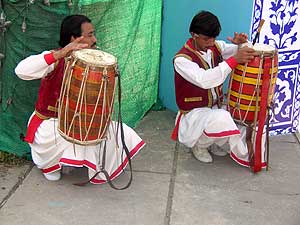 Whirling in a ritual reverie, the Sufi drummer looks toward the sky and knocks out a feverish beat. The bearded men in bright traditional robes dance and shout around him each frantically following his own path to enlightenment.
Whirling in a ritual reverie, the Sufi drummer looks toward the sky and knocks out a feverish beat. The bearded men in bright traditional robes dance and shout around him each frantically following his own path to enlightenment.
It is midnight in Lahore, Pakistan's city of culture and mysticism, and hundreds of Muslim men have packed the dingy courtyard outside the ramshackle Baba Shah Jamal shrine for the weekly ritual. They have come to see Pappu Sain, the renowned and rotund Sufi drummer who leads the spectacle every Thursday with a lion-like roar and an enormous beard. He has performed throughout the Muslim world and in Germany, Switzerland and Britain. His followers say he has no equal. As his hands bang a double sided drum he wears slung over his shoulder, dancers vie to get as close to him as possible, stomping their feet and shaking sweat-soaked hair in rhythm with the beat.
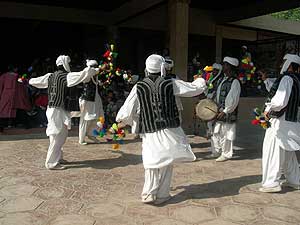 The closer to Pappu, the closer to God. Sufism is the venerable mystical, or ecstatic, movement within Islam. In the folk form common in Pakistan and elsewhere, devotees believe that ordinary people are too sinful to address God directly, and must instead make their requests through pure and learned saints, or Sufis. They believe the dance is a way of expressing their love for their favoured saint, and performers say they experience an ecstasy that lifts them out of their earthly bodies. Practiced throughout the Islamic world, Sufism is particularly popular among the poor. Orphans and beggars surround most Sufi shrines, seeking handouts of rice or spare change.
The closer to Pappu, the closer to God. Sufism is the venerable mystical, or ecstatic, movement within Islam. In the folk form common in Pakistan and elsewhere, devotees believe that ordinary people are too sinful to address God directly, and must instead make their requests through pure and learned saints, or Sufis. They believe the dance is a way of expressing their love for their favoured saint, and performers say they experience an ecstasy that lifts them out of their earthly bodies. Practiced throughout the Islamic world, Sufism is particularly popular among the poor. Orphans and beggars surround most Sufi shrines, seeking handouts of rice or spare change.
At the shrine in Lahore, Shah Jamal- a 19th century saint who preached Islamic ideals through dancing and drum, beating - is buried in a crypt upstairs from the courtyard. Followers pray to him for a better job, a healthy child, a good marriage. "I have not missed a single Thursday gathering here in the last 25 years," said Naseer Ahmad, a 58-year-old street salesman. "I don't have a concept of life with- out bowing at this shrine. All my life is devoted to pleasing the saint, and in return he gives me purpose."
For believers, top drummers like Pappu are revered as conduits to the heavens. "It is' amazing, but when I beat the drum at a high speed, I feel nothing - just my mind," says the 42-year-old Pappu, seated cross -legged before the performance on a blanket of honour under the courtyard's main wall. "I couldn't play this way if I were here in my body. I am wherever God takes me."
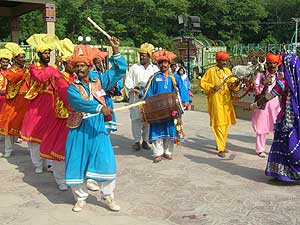 As the excitement builds, Pappu begins to spin, beating his drum at arms' length as the crowd roars its approval. Some of the half dozen dancers around him fall to the ground in exhaustion or dizziness, but they quickly get up.
As the excitement builds, Pappu begins to spin, beating his drum at arms' length as the crowd roars its approval. Some of the half dozen dancers around him fall to the ground in exhaustion or dizziness, but they quickly get up.
The beat is deafening and hypnotic. Besides the devout, the dance draws a tiny smattering of foreigners, and a sizable contingent of Pakistanis . "I feel like I am in the clouds and close to my creator whenever I visit this place," said Emanuel Sarfraz, a bearded 42-year-old mechanic, "For me, visiting the shrine has nothing to do with religion. It is simply ecstasy,"
This is the present day Pakistan that sensational journalism misses out on ..a Pakistan that every foreign visitor highlights as "most peaceful and friendly country that we enjoyed".
The modern state of Pakistan was established on 14 August 1947. From the Arabian sea on the Indian ocean Pakistan stretches to a length of 1,800 kilometers into the mountains of Central Asia covering an area of 803,940 square kilometers/ 499,545 square miles, making it nearly four times as larger as Great Britian. It has a population of 162.4 million, with a literacy rate of 48.7 % , of which 61.7% are male and 35.2% female. Both English and Urdu are the official languages of Pakistan.
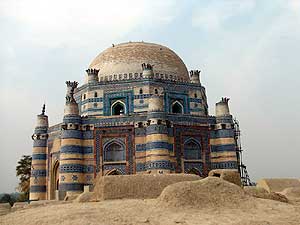 Pakistanís history overlaps that of ancient India, Iran and Afghanistan. The region was a crossroad of historic trade routes, including the Silk Road and was settled over thousands of years by many groups, including Dravidians, Indo Aryans, Persians, Macedonians, Greeks, Scythians, Parthians, Kushans, White Huns, Afghans, Arabs, Turks and Mongols. The earliest evidence of humans in the region are pebble tools from the Soan culture in the province of Punjab dated from 100,000 to 500,000 years ago. The Indus region was the site of several ancient cultures including Mehrgarh one of the world's earliest known towns, and the Indus valley Civilisation at Harappa and Mohenjo Daro. (2500 BC - 1500 BC)..
Pakistanís history overlaps that of ancient India, Iran and Afghanistan. The region was a crossroad of historic trade routes, including the Silk Road and was settled over thousands of years by many groups, including Dravidians, Indo Aryans, Persians, Macedonians, Greeks, Scythians, Parthians, Kushans, White Huns, Afghans, Arabs, Turks and Mongols. The earliest evidence of humans in the region are pebble tools from the Soan culture in the province of Punjab dated from 100,000 to 500,000 years ago. The Indus region was the site of several ancient cultures including Mehrgarh one of the world's earliest known towns, and the Indus valley Civilisation at Harappa and Mohenjo Daro. (2500 BC - 1500 BC)..
The Indus Valley civilisation collapsed in the middle of the second millennium BC and was followed by the Verdic civilization which extended over much of northern India and Pakistan. Successive empires and kingdoms ruled the region from the Achemenid Persian empire around 543 BC, to Alexander the Great in 326 BC and the Mauryan empire.
The Indo Greek Kingdom founded by Demetrius of Bactria included Gandhara and Punjab from 184 BC, and reached its greatest extent under Menander establishing the Greco Buddhist period with advances in trade and culture. The city of Taxila became a major centre of learning in ancient Buddhist times - the remains of the city, and Takht i Bai are one of the country's major Buddhist archaeological sites.
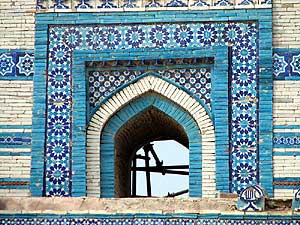 In 712 AD, the Arab general Muhammed bin Qasim conquered Sindh and Multan in southern Punjab setting the stage for several successive Muslim empires including the Ghazanvid empire, the Ghori kingdom, the Delhi Sultanate and the Mughal empire before the British Empire gained control over south Asia.
In 712 AD, the Arab general Muhammed bin Qasim conquered Sindh and Multan in southern Punjab setting the stage for several successive Muslim empires including the Ghazanvid empire, the Ghori kingdom, the Delhi Sultanate and the Mughal empire before the British Empire gained control over south Asia.
Pakistan is a federation of four provinces, a capital territory and federally administered tribal areas. It is an Islamic state and the vast majority of the population are Muslims. Muslims are the followers of the Prophet Mohammed. Though Christians and Muslims fought a protracted war for supremacy of their ideology, the two religions have much in common. Many of the stories of the Christian Old Testament are found in the Koran and Muslims revere all the Christian prophets. They do not accept the deification of Christ but they do regard him as the penultimate prophet. An important difference between the two religions is in their organization. Unlike Christian churches, Islam has no formal hierarchy and mullahs are not appointed or elected.
In Pakistan Muslims, Hindus, Buddhists, Sikhs, and Christians live peacefully following their own religious practices, celebrating their own festivals and holidays. Thousands of Sikhs come from across the world to visit several holy sites in Punjab, including the shrine of Guru Nanak the founder of Sikhism at Hassan Abdal in Attock District and his birthplace, at Nankana Sahib. Buddhist visit their sacred centers and with the easing of relationship with India many Sikhs and Hindus come on pilgrimage to their religious sites and local festivals in Pakistan.
Hindukush Trails runs trips in all the four provinces of Pakistan.
- Please contact us for more information.